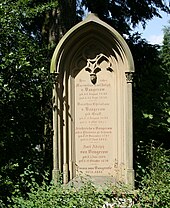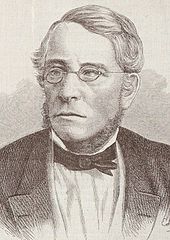Adolph von Vangerow
Karl Philipp Adolph von Vangerow (born June 5, 1808 in Schiffelbach ; † October 11, 1870 in Heidelberg ) was professor of law at the Universities of Marburg and Heidelberg , an expert in the field of pandects and a secret councilor .
biography
Vangerow came from an old Pomeranian noble family and was the only child of the Hessian Rittmeister Wilhelm von Vangerow (1786–1824) and Friederike von Tilemann called Schenck (1785–1862). At the time of Karl Adolph's birth, his father was serving in Spain, where he fought on the side of Napoleon's opponents , and the boy spent his early years on the estate of his mother's parents in Schiffelbach. When the father was back in service after the end of the Kingdom of Westphalia , he was stationed first in Melsungen , then in Fulda and finally in Marburg , and the son therefore attended grammar schools in Fulda and Marburg. He graduated from high school at the age of 16 and enrolled at the University of Marburg in 1824, the year in which his father died soon afterwards. Six years later, on January 23, 1830, he received his doctorate in law . who followed his habilitation as a private lecturer at the Marburg law faculty at Easter .
Since the salary of a private lecturer was not enough for him to live, Vangerow earned the additionally necessary maintenance by means of numerous tutorials , which he held alongside his lectures. He would later like to tell that through these revision courses, in addition to the lectures, he had done an almost superhuman work, but owed this commitment to the full mastery of the subject matter of the Pandects and the dexterity of the lectures as a lasting benefit.

Three years later, on September 6, 1833, at the age of 25, he was appointed associate professor at the University of Marburg and four years later, on June 14, 1837, full professor. He acquired a reputation for exceptional teaching talent.
When the chair for Roman law at the University of Heidelberg had to be filled in March 1840 after the death of Anton Friedrich Justus Thibaut , Karl Adolph von Vangerow accepted a call for this full professorship. Vangerow taught Roman law at Heidelberg University for 30 years and attracted students from all over Germany, so the lecture hall had to be enlarged.
Vangerow married on May 15, 1834 in Marburg Dorothea Graf (born August 5, 1806 in Treis an der Lumda , † October 4, 1857 in Heidelberg), the daughter of the Hessian court procurator Konrad Graf and Luise Theis . They had three sons and three daughters. Two of the sons and a daughter died at an early age. The other children outlived their parents but left no offspring.
Last phase of life
Vangerow's wife died after long suffering at the age of 51 in 1857; Karl Adolph von Vangerow survived her by 13 years. He held lectures until shortly before his death, although he was suffering from lung and diabetes, and died on October 11, 1870 in the Palais von Wieser, which he lived in, at Märzgasse 18 in Heidelberg. The family house at Märzgasse 18 was known to the citizens of Heidelberg as the “Vangerow House” well into the 20th century. The University of Heidelberg honors Vangerow as one of its most important professors.
Adolph von Vangerow and his wife Dorothea Christine von Vangerow found their final resting place in the Bergfriedhof (Heidelberg) . After the family grave was closed, the tombstone, made in the neo-Gothic style, is now located in the mountain cemetery to commemorate the great legal scholar in Department D.
Honors
The city of Heidelberg awarded Karl Adolph von Vangerow honorary citizenship . In his honor, a street in Heidelberg-Bergheim was named Vangerowstrasse.
plant
Teaching was his main activity. His contemporaries were of the opinion that Vangerow not only had extensive knowledge, he also had the gift of being able to present even the driest matter in free, fluent language.
His main work is his textbook on the Pandects, which has been revised a total of seven times.
It is still to be said that the pandect science forms the foundation of today's civil code .
Publications (selection)
-
Textbook of the Pandects , 7th, probably and verb. Ed., Marburg [u. a.]
- Volume 1 - 1863 (complete image scan)
- Volume 2 - 1867 (complete image scan)
- Volume 3 - 1869 (complete image scan)
-
Guide to Pandekten-Vorlesungen , Marburg [u. a.]
- Volume 1,1: (1st book: Allg. Lehren) - 1843 (complete image scan)
- Volume 1,2: (2nd book: Sg Familienrecht; 3rd book: Dinglicherechte) - 1843 (complete image scan)
- Volume 2: (4th book: The law of inheritance) - 1843 (complete image scan)
- Volume 3: (5th book: The Obligations) - 1849 (complete image scan)
literature
- Martin Avenarius: Vangerow, Karl Adolph von. In: New German Biography (NDB). Volume 26, Duncker & Humblot, Berlin 2016, ISBN 978-3-428-11207-5 , pp. 709-711 ( digitized version ).
- Genealogical manual of the aristocracy , aristocrat of houses A . Volume XVII, page 493, volume 81 of the complete series, CA Starke Verlag, Limburg (Lahn) 1983.
- Hans-Peter Haferkamp: Karl Adolph von Vangerow (1808-1870). Pandect law and “mummy cult” . In: ZEuP . 16. Vol. 2, 2008, pp. 813-844.
- Ernst Landsberg : Vangerow, Karl Adolf von . In: Allgemeine Deutsche Biographie (ADB). Volume 39, Duncker & Humblot, Leipzig 1895, pp. 479-482.
- Friedrich von Weech (Ed.): Badische Biographien , first part. Ms. Bassermann, Heidelberg, 1875, pp. 382-385
| personal data | |
|---|---|
| SURNAME | Vangerow, Adolph von |
| ALTERNATIVE NAMES | Vangerow, Karl Philipp Adolph von; Vangerow, Carl Adolph von |
| BRIEF DESCRIPTION | German lawyer |
| DATE OF BIRTH | June 5, 1808 |
| PLACE OF BIRTH | Schiffelbach near Marburg |
| DATE OF DEATH | October 11, 1870 |
| Place of death | Heidelberg |
